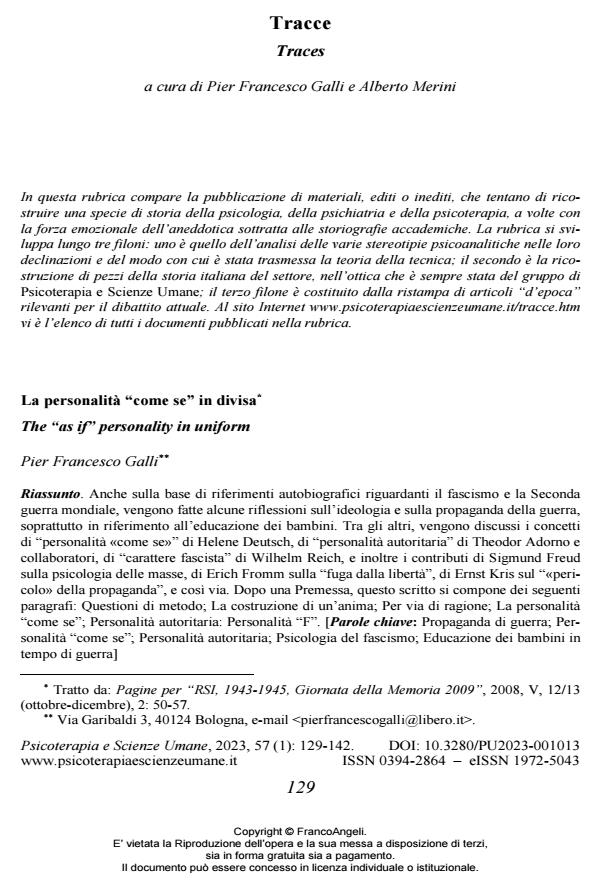The "as if" personality in uniform
Journal title PSICOTERAPIA E SCIENZE UMANE
Author/s Pier Francesco Galli
Publishing Year 2023 Issue 2023/1
Language Italian Pages 14 P. 129-142 File size 134 KB
DOI 10.3280/PU2023-001013
DOI is like a bar code for intellectual property: to have more infomation
click here
Below, you can see the article first page
If you want to buy this article in PDF format, you can do it, following the instructions to buy download credits

FrancoAngeli is member of Publishers International Linking Association, Inc (PILA), a not-for-profit association which run the CrossRef service enabling links to and from online scholarly content.
Also on the basis of autobiographical memories regarding fascism and the Second World War, some reflections are made on the ideology and propaganda of the war, especially in reference to the education of children. Among others, the following concepts are discussed: the "«as if» per-sonality" of Helene Deutsch; the "authoritarian personality" of Theodor Adorno and collabora-tors, and the "fascist character" described by Wilhelm Reich. Also other contributions are mentioned, such as Sigmund Freud’s study on mass psychology, Erich Fromm’s reflections on "es-cape from freedom", Ernst Kris’ considerations on the "danger" of propaganda, and so on. After an Introduction, this paper consists of the following paragraphs: Questions of method; The con-struction of a soul; By way of reason; The "as if" personality; Authoritarian Personality: "F" Per-sonality.
Keywords: War propaganda; "As if" personality; Authoritarian personality; Psychology of fascism; Children’s education in times of war
- La personalità "come se" in divisa Pier Francesco Galli, in PSICOTERAPIA E SCIENZE UMANE 1/2023 pp.129
DOI: 10.3280/PU2023-001013 - Alcune pubblicazioni di Pier Francesco Galli elencate in ordine cronologico A cura della Redazione, in PSICOTERAPIA E SCIENZE UMANE 3/2024 pp.419
DOI: 10.3280/PU2024-003003
Pier Francesco Galli, La personalità "come se" in divisa in "PSICOTERAPIA E SCIENZE UMANE" 1/2023, pp 129-142, DOI: 10.3280/PU2023-001013